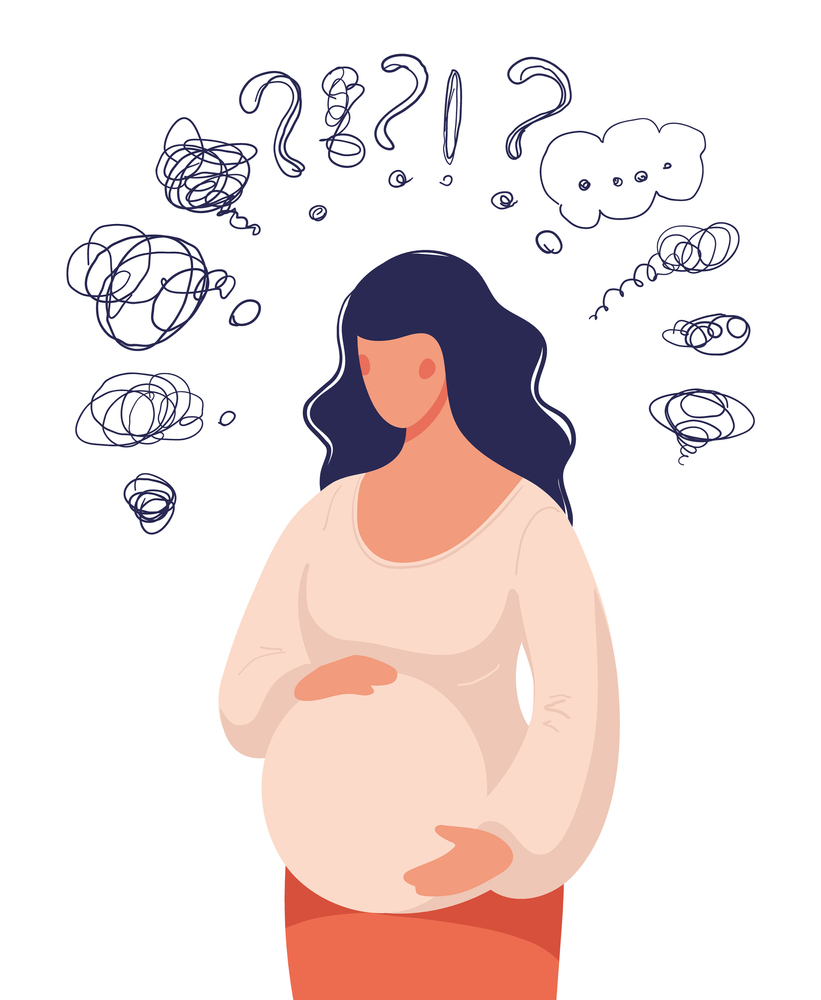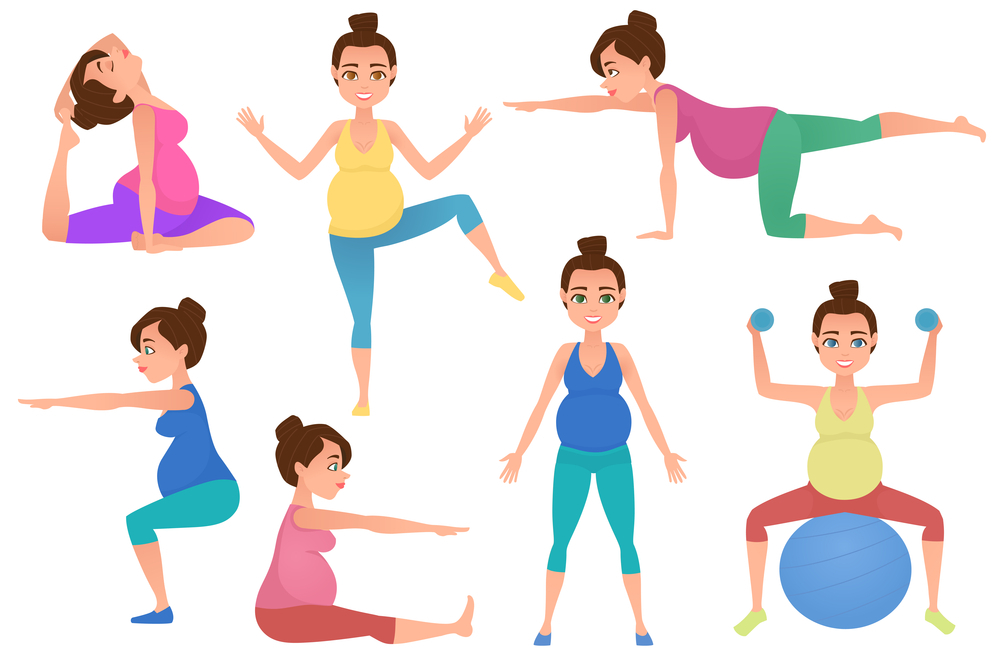Pregnancy is an exciting time in one’s life. You’ll soon be a parent to a cute, tiny human. You may anticipate a rollercoaster of emotions during your pregnancy, or emotions may catch you off guard. Some women experience joy with each flutter or kick, marveling at their changing bodies. Pregnancy is difficult for other women, as it causes extreme fatigue, mood swings, and constant anxiety. You may notice that your thoughts are spiraling out of control with each passing month, affecting your work performance and family relationships. But how do you deal with your anxiety, and should you try to treat it?
What causes anxiety during pregnancy?

Worries are common during pregnancy. Pregnancy hormone changes, previous heartbreaking miscarriages, and sleep difficulties can all contribute to anxiety in expectant mothers. You may be concerned about how having a baby will affect your relationships with friends and family members, your future child’s health, the delivery experience, or the financial burden of adding another family member. All of these concerns are entirely understandable. Anxiety is protective for humans; otherwise, how would we motivate ourselves to finish our work or flee from a bear?
What are the signs and symptoms of anxiety disorders in pregnancy?

Although it is normal to be concerned about your baby’s health, in some cases this concern becomes debilitating and may necessitate additional care. Even when doctors are reassuring, thoughts about the baby’s health can become obsessive. Worries can manifest physically as symptoms such as a racing heart, difficulty breathing, or panic attacks. If this is your first experience with high levels of anxiety, it can be frightening. If your doctor notices that your anxiety is interfering with your daily functioning, relationships, or job performance, it may be diagnosed as an anxiety disorder.
Anxiety can appear at any time during pregnancy, or it may appear only after the baby is born (perinatal anxiety is the term used for anxiety during pregnancy and after delivery). The rates of GAD appear to be highest in the first trimester, most likely due to hormonal changes. Constant worrying, restlessness, muscle tension, irritability, feeling dread, inability to concentrate, and difficulty falling asleep due to worries are the most common symptoms of anxiety. Other anxiety disorders, such as panic disorder, obsessive-compulsive disorder, or post-traumatic stress disorder, can cause symptoms in some women.
What are the consequences of untreated anxiety on the developing foetus?

When considering anxiety management, it is critical to consider both the risks of treatment as well as the harms of untreated anxiety. Despite being less studied than depression, research suggests that anxiety may have a negative impact on both the mother and the foetus. Anxiety increases the chances of having a premature baby, having a low birth weight, having a baby at a younger gestational age, and having a smaller head circumference (which is related to brain size).
What are some treatments for pregnancy anxiety?

Fortunately, there are numerous treatments available to help reduce anxiety during pregnancy and make you feel better. Anti-anxiety medication is not an option for many women during pregnancy because there is little information on the safety of such medication on the foetus. Some women who had previously taken anxiety medications may wish to discontinue them during pregnancy for personal reasons.
Cognitive behaviour therapy (CBT) and other therapies show promise in the peripartum period (the period shortly before, during, and after giving birth). CBT focuses on challenging maladaptive thoughts, emotions, and behaviors, and it employs anxiety-reduction techniques such as diaphragmatic breathing (adapted to pregnancy).
Medication may be an option if your anxiety is severe. Selective serotonin reuptake inhibitors (SSRIs) are commonly used to treat depression and anxiety during and after pregnancy. SSRIs do not appear to be linked to an increased risk of major congenital malformations. SSRIs, on the other hand, may be associated with transient neonatal symptoms such as jitteriness, tremor, crying, and feeding difficulties. However, these will resolve on their own after a few days.
What else can help with pregnancy anxiety?

Participate in regular physical activity.
Physical activity is generally safe to do during pregnancy. However, if you are at risk of preterm labor or have pregnancy complications, you should first consult with your doctor.
Make sure you get enough sleep.
Whether it’s a relaxing bedtime routine, a pregnancy pillow, or a few nights in a bed away from your snoring partner, now is the time to figure out what works best for you.
Make an effort to be mindful.
According to research, mindfulness can help reduce labor anxiety and even prevent postpartum depression.
Schedule room for worry.
We are frequently concerned because we do not want to forget something. Setting aside 30 minutes at the end of the day not only allows you to worry productively, but it also frees you from carrying your worries with you the rest of the day (remind yourself “I’ll get to these thoughts later”).
Yoga, massage, meditation, and acupuncture are all options.
Finding relaxation techniques that work for you may require some trial and error. But the benefits will last long after the baby is born.
Talk about it
It’s critical to tell someone if you’re experiencing severe anxiety during your pregnancy. Your partner, a close friend, or a family member may be able to provide assistance. Sharing your thoughts and feelings with others may be enough to keep them from taking over your life. You can also ask your doctor to refer you to a therapist who specializes in anxiety treatment. Some therapists specialize in working with expectant mothers.
Identify a release
Participating in activities that reduce stress and anxiety may be a good option for you. Physical activity increases the release of endorphins in the body. In your brain, these act as natural pain relievers. One of the most recommended ways to deal with stress is to move your body.
Activities that are effective include:
walking
running
yoga
Do you dislike strolling, jogging, or striking a pose? Do what you enjoy! Anything that gets your body moving can be advantageou. Aerobic activity for as little as five minutes has been shown to be beneficial. Before beginning a new exercise routine during pregnancy, always consult with your doctor.
Change your perspective
You can try the following activities to help your body release endorphins without breaking a sweat:
meditation
acupuncture
Therapuetic massage
Exercising your deep breathing
Deep abdominal breathing for 20 to 30 minutes per day is recommended by the American Institute of Stress to help with anxiety. This will help to increase the amount of oxygen in your brain and stimulate your nervous system.
Close your eyes and get comfortable in a seated position to try it. Imagine yourself smiling inwardly and releasing muscle tension. Then imagine that you have holes in your feet. Inhale deeply and visualise the air flowing through your body. Repeat with an exhalation.
Get some rest.
It is critical to ensure that you are getting enough sleep. Though sleep may appear elusive during pregnancy, making it a priority may significantly reduce your anxiety symptoms. Do you have frequent nighttime awakenings? When you feel the need to nap, try sneaking one in.
Write a report on it.
You might not feel like talking at times. All of those feelings and thoughts have to go somewhere. Start a journal where you can express yourself without fear of being judged.
Writing down your thoughts and feelings may help you organize or prioritize your concerns. You can also keep track of different triggers to share with your doctor.
Writing about your concerns can help you brainstorm potential solutions and allow you to reflect on them.
Empower yourself
The fear of childbirth is known as tokophobia. If your anxiety is related to childbirth, consider taking a birth class. Learning about the various stages of labor, what your body goes through, and what to expect at each stage may help to de-mystify the process.
These classes frequently provide advice on how to deal with pain. They will also provide you with the opportunity to converse with other mothers who may be concerned about similar issues.
Consult your doctor
Call your doctor if your anxiety is interfering with your daily life or if you are having frequent panic attacks. The sooner you seek assistance, the better. Aside from seeing a therapist, there may be medications you can take to alleviate your most severe symptoms. You should never be embarrassed to express your thoughts and feelings, especially if they are personal to you.
Do you feel like you’re not getting enough help? You can always switch service providers.
Read : 7 Sleep Myths — Busted – V Cure (vcurehealthcare.com)





